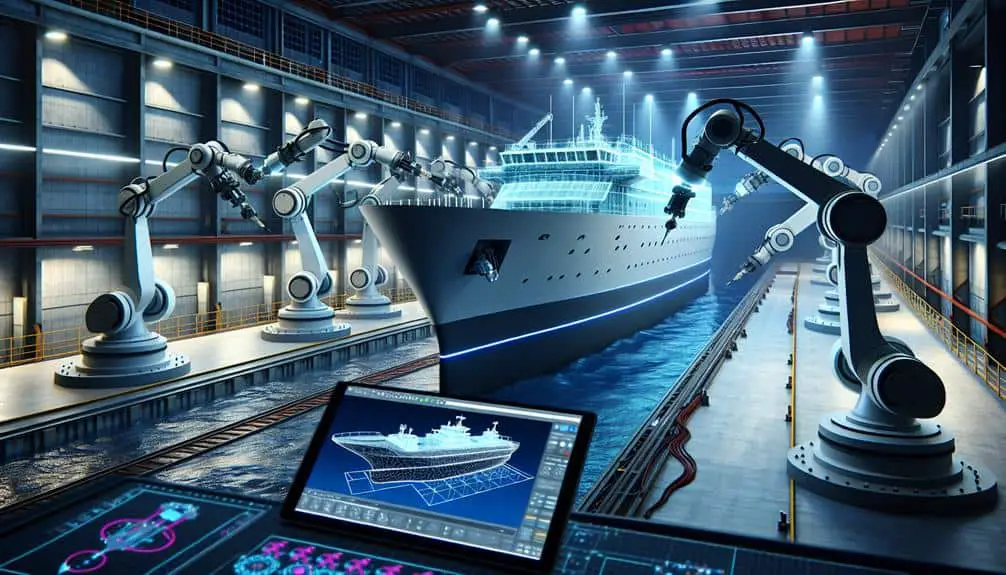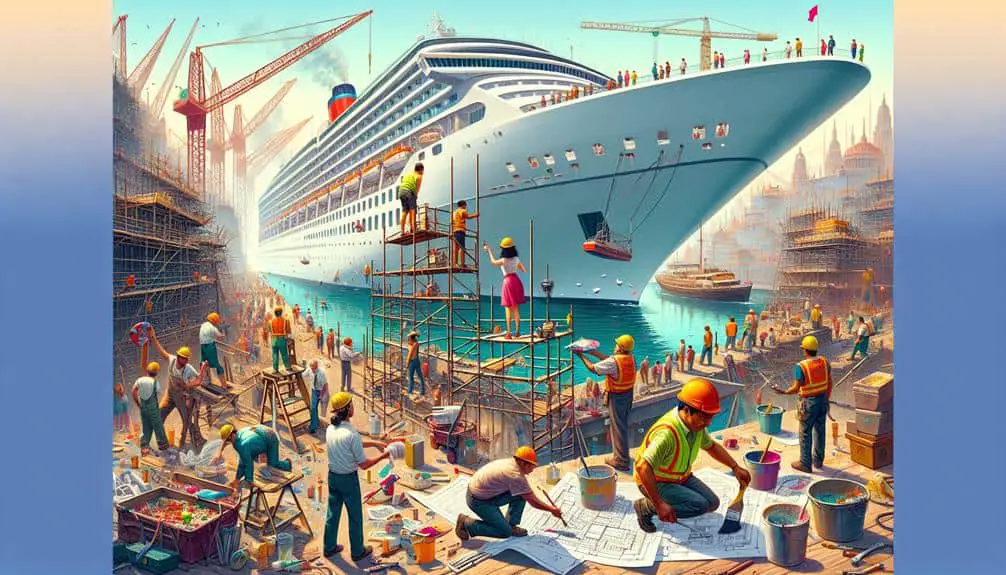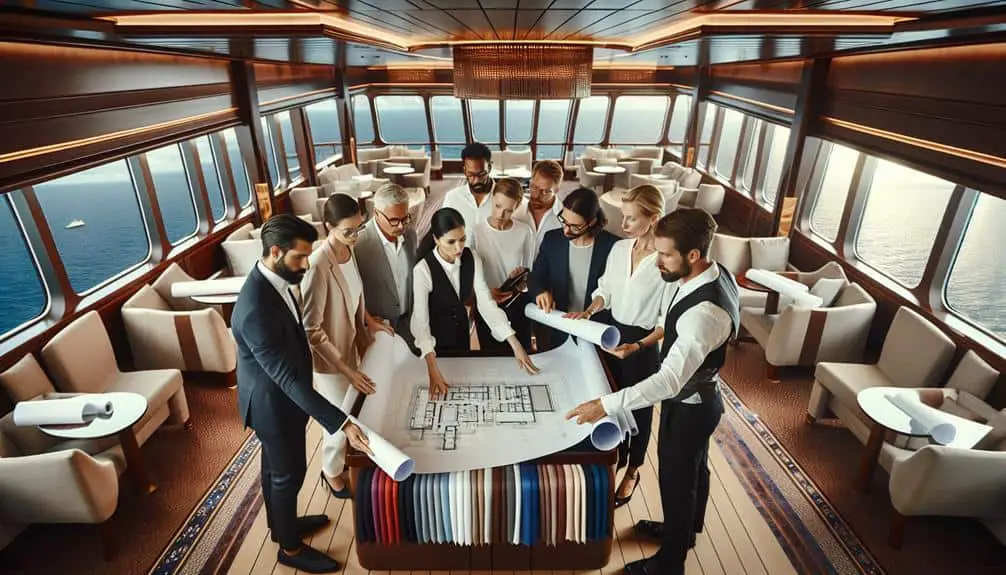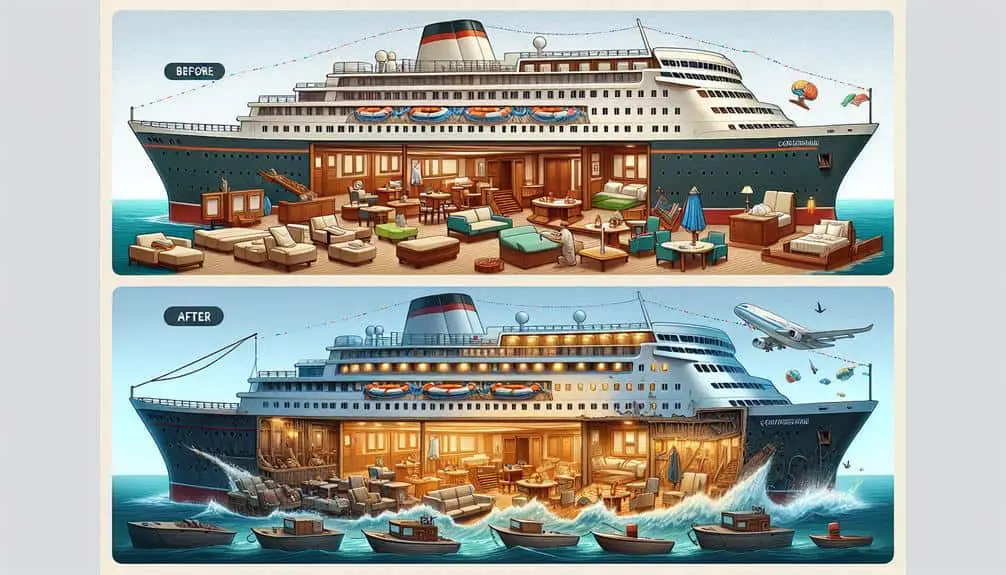Upgrade your ship renovation projects with cutting-edge technologies like Virtual Reality Simulation for immersive training. Advanced Hull Coatings enhance corrosion resistance and improve fuel efficiency. Energy-Efficient Lighting Systems optimize energy use with LED upgrades. Smart Automation streamlines maintenance and tasks for ideal operations. Sustainable Power Generation integrates solar panels and wind turbines for eco-friendly operation. Enhance Waste Management with advanced sorting tech. IoT Monitoring guarantees predictive maintenance with real-time data. Discover these innovative technologies for efficient, cost-effective, and environmentally conscious ship renovations.
Key Points
- Virtual Reality Simulation offers accurate ship renovation training.
- Advanced Hull Coatings enhance corrosion resistance and fuel efficiency.
- Energy-Efficient Lighting Systems save energy and improve aesthetics.
- Smart Automation Solutions automate tasks for optimal ship operations.
- Sustainable Power Generation integrates solar and wind for eco-friendly operations.
Virtual Reality Simulation
Using cutting-edge virtual reality simulation technology, ship renovation projects can now be visualized and planned with unparalleled accuracy and efficiency. Immersive training through realistic simulations allows for a thorough understanding of the renovation process. By utilizing virtual reality, you can interact with a digital representation of the ship, inspecting every detail and simulating various renovation scenarios.
The realistic simulations provided by virtual reality technology enable you to practice renovation tasks in a simulated environment before implementing them on the actual ship. This hands-on experience enhances your skills and familiarity with the renovation process, reducing the margin for error during the actual project. Virtual reality simulations also offer a safe space to experiment with different renovation approaches and techniques, fostering innovation and problem-solving capabilities.
Immersing yourself in a virtual environment where you can navigate through the ship and visualize the renovation plans in real-time enhances your decision-making process. The level of detail and accuracy achieved through virtual reality simulations revolutionizes the way ship renovation projects are conceptualized and executed.
Advanced Hull Coatings
When it comes to ship renovations, advanced hull coatings provide significant benefits.
Enhanced corrosion resistance guarantees a longer lifespan and reduced maintenance costs.
Additionally, improved fuel efficiency contributes to a more environmentally friendly operation.
Improved Corrosion Resistance
To enhance the longevity of vessels exposed to harsh marine environments, shipbuilders are increasingly turning to cutting-edge technologies such as advanced hull coatings with improved corrosion resistance. These coatings utilize innovative corrosion prevention techniques and are designed to provide long-lasting protection against the corrosive effects of seawater, chemicals, and other environmental factors.
By incorporating specialized additives and advanced polymer blends, these coatings form a robust barrier that shields the ship's hull from degradation, rust, and erosion. The application of these advanced hull coatings not only enhances the durability of the vessel but also reduces maintenance costs and downtime associated with frequent recoating.
Shipowners can expect extended service life and improved performance from their vessels with the implementation of these state-of-the-art corrosion-resistant coatings.
Enhanced Fuel Efficiency
Employing advanced hull coatings with enhanced fuel efficiency capabilities greatly improves the performance of vessels sailing through various marine conditions. These coatings utilize innovative technologies to reduce drag and enhance the hydrodynamic efficiency of the hull, resulting in significant fuel savings.
By incorporating propulsion optimization techniques, such as air lubrication systems or advanced hull designs, ships can achieve higher speeds with lower fuel consumption. Additionally, eco-friendly upgrades like silicone-based coatings or nanotechnology-infused paints not only improve fuel efficiency but also reduce the environmental impact of vessel operations.
Investing in these cutting-edge solutions not only benefits the ship operators by lowering operating costs but also contributes to a more sustainable maritime industry.
Energy-Efficient Lighting Systems
Upgrade to LED lighting for your ship's renovation project to benefit from energy efficiency and cost savings.
Implement smart lighting controls to optimize energy usage and create a more sustainable lighting system.
These cutting-edge technologies won't only enhance onboard aesthetics but also contribute to a greener and more efficient operation.
LED Lighting Benefits
Implementing LED lighting systems in ship renovations revolutionizes energy efficiency and lighting quality onboard. LED technology offers significant energy savings compared to traditional lighting systems, making it a cost-effective choice for ship operators.
Beyond the financial aspect, LED lighting enhances the aesthetics of the vessel, providing a modern and sleek appearance. The improved color rendering capabilities of LEDs create a more vibrant and inviting atmosphere throughout the ship.
Additionally, LED lights have a longer lifespan and require less maintenance, reducing downtime for replacements and minimizing operational disruptions. By incorporating LED lighting into ship renovations, not only are you benefiting from energy efficiency and cost savings, but you're also enhancing the overall visual appeal of the vessel.
Smart Lighting Controls
Smart lighting controls, a cornerstone of energy-efficient lighting systems, optimize illumination levels based on occupancy and natural light, ensuring enhanced efficiency and environmental sustainability in ship environments.
Through wireless integration, these cutting-edge controls enable precise adjustments to lighting output, responding dynamically to changing conditions onboard.
By automatically dimming or turning off lights in unoccupied areas and adjusting brightness levels according to available natural light, significant energy savings can be achieved.
Not only do smart lighting controls contribute to reducing electricity consumption, but they also enhance the overall comfort and safety of passengers and crew members.
Embracing this technology not only modernizes the ship's lighting infrastructure but also aligns with eco-conscious initiatives, making it a vital element in contemporary ship renovations.
Smart Automation Solutions
Leveraging cutting-edge technology, ship renovations now integrate advanced automation solutions for enhanced efficiency and performance. Automated maintenance plays a significant role in ensuring ideal ship operations by utilizing intelligent systems that can detect and address maintenance needs proactively. These smart automation solutions revolutionize traditional ship maintenance practices, offering a more streamlined and data-driven approach.
Here are four key aspects highlighting the benefits of smart automation solutions in ship renovations:
- Predictive Maintenance: Implementing sensors and AI algorithms to predict potential equipment failures before they occur, reducing downtime and maintenance costs.
- Automation of Routine Tasks: Using robotics and automation to perform routine tasks such as cleaning, painting, and inspection, freeing up crew members for more critical duties.
- Integrated Monitoring Systems: Centralized monitoring systems that provide real-time data on various ship components, enabling quick decision-making and preventive actions.
- Energy Efficiency Optimization: Smart automation solutions help optimize energy consumption by adjusting systems based on real-time conditions, leading to reduced fuel consumption and operational costs.
These advanced technologies are reshaping the maritime industry, enhancing safety, efficiency, and sustainability on modern ships.
Sustainable Power Generation
How can sustainable power generation technologies revolutionize ship operations and reduce environmental impact in the maritime industry?
By integrating cutting-edge technologies such as solar panels and wind turbines, ships can greatly decrease their reliance on traditional fuel sources, leading to more eco-friendly and cost-effective operations.
Solar panels, utilizing photovoltaic cells, harness sunlight to generate electricity. These panels can be mounted on the ship's deck or superstructure, providing a continuous source of clean energy.
Additionally, wind turbines can be strategically placed on board to capture wind energy and convert it into power. This dual approach of solar and wind power generation diversifies the ship's energy sources, making it less dependent on fossil fuels and reducing greenhouse gas emissions.
Enhanced Waste Management Systems
Enhanced waste management systems onboard ships can greatly improve operational efficiency and environmental sustainability. Implementing recycling initiatives and waste reduction strategies are essential components of these systems.
Here are four innovative ways to enhance waste management on ships:
- Advanced Sorting Technologies: Utilize cutting-edge sorting technologies to separate different types of waste efficiently. This guarantees that recyclable materials are properly handled and diverted from landfills.
- Green Technology Integration: Incorporate environmentally friendly solutions such as composting systems or anaerobic digesters to manage organic waste onboard. These technologies help reduce the environmental impact of waste disposal.
- Automated Waste Monitoring Systems: Implement automated systems to monitor waste generation in real-time. This data can help optimize waste management processes and identify areas for improvement.
- Closed-Loop Systems: Establish closed-loop systems where waste is repurposed or recycled within the ship's operations. This approach minimizes the need for external waste disposal and promotes a more sustainable waste management strategy.
IoT Monitoring and Maintenance
To optimize operational efficiency and guarantee proactive maintenance practices, incorporating IoT monitoring systems on ships is crucial. These systems enable predictive maintenance by collecting real-time data on machinery performance, allowing for timely interventions before critical failures occur. Remote monitoring capabilities provide ship operators with the ability to oversee vessel functions from onshore locations, enhancing overall safety and reducing operational costs.
Real-time diagnostics offered by IoT technologies allow for immediate identification of any anomalies or potential issues within the ship's systems. Condition monitoring sensors track variables such as temperature, pressure, and vibration, providing insights into the health of essential equipment. By analyzing this data, maintenance schedules can be optimized, downtime minimized, and the lifespan of components extended.
Implementing IoT monitoring and maintenance solutions revolutionizes traditional ship upkeep practices, offering a proactive approach to vessel management. By harnessing the power of predictive maintenance and remote monitoring, ship operators can secure smooth operations while prioritizing safety and efficiency.
Frequently Asked Questions
How Long Does It Typically Take for a Ship to Undergo a Complete Renovation Using Cutting-Edge Technologies?
Revamping a ship with cutting-edge tech can take months, but the payoff is worth it. The renovation timeline hinges on the vessel's size and complexity, ensuring cost benefits in the long run.
What Are the Potential Cost Savings Associated With Implementing These Advanced Renovation Technologies on a Ship?
To understand the potential cost savings of implementing advanced ship renovation technologies, conduct a thorough cost analysis. Efficiency benefits can lead to a significant return on investment, generating long-term savings for your operations.
Are There Any Specific Regulations or Certifications That Ships Must Meet When Incorporating These Innovative Technologies Into Their Renovation Plans?
When incorporating state-of-the-art ship renovation technologies, particular regulations and certifications must be met. Guarantee compliance with maritime guidelines for safety and environmental standards. Understanding these requirements is essential for successful integration and sustainable ship renovation projects.
How Do These Technologies Impact the Overall Sustainability and Environmental Footprint of a Renovated Ship?
When incorporating cutting-edge ship renovation technologies, you'll witness a significant improvement in energy efficiency and reduced carbon emissions. Eco-friendly materials and waste reduction methods play an essential role in enhancing sustainability and minimizing the environmental footprint of renovated ships.
Are There Any Challenges or Limitations to Consider When Integrating Multiple Cutting-Edge Technologies Into a Single Ship Renovation Project?
When integrating cutting-edge technologies into ship renovations, challenges arise. Coordinating various systems, ensuring compatibility, and managing complexities can limit seamless integration. Have you considered how these limitations impact the overall success of your renovation project?



